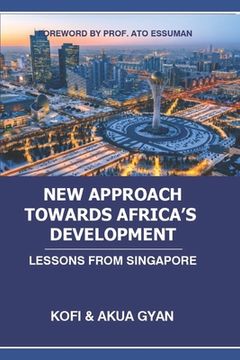Compartir
New Approach Towards Africa's Development: Lessons from Singapore (en Inglés)
Akua Gyan
(Autor)
·
Kofi And Akua Gyan
(Autor)
·
George Padmore Library, Accra Ghana
· Tapa Blanda
New Approach Towards Africa's Development: Lessons from Singapore (en Inglés) - Gyan, Akua ; And Akua Gyan, Kofi
$ 17.73
$ 35.46
Ahorras: $ 17.73
Elige la lista en la que quieres agregar tu producto o crea una nueva lista
✓ Producto agregado correctamente a la lista de deseos.
Ir a Mis Listas
Origen: Estados Unidos
(Costos de importación incluídos en el precio)
Se enviará desde nuestra bodega entre el
Lunes 22 de Julio y el
Miércoles 31 de Julio.
Lo recibirás en cualquier lugar de Ecuador entre 1 y 3 días hábiles luego del envío.
Reseña del libro "New Approach Towards Africa's Development: Lessons from Singapore (en Inglés)"
Third World states have been in search of adding self-sufficiency to political freedom since independence. However, sustainable solutions to developmental problems in developing countries remain elusive. The reason is that, these countries have often adopted strategies that have not been able to reconcile local circumstances with the ever increasing demands of the international climate. This suggests the need for a new approach to transformation and growth. The "miracle" of Singapore to achieve self-sustaining socioeconomic growth by combining indigenous strategies with elements of Western paradigms, seems to indicate that there are other dimensions to the problem of underdevelopment that have not been considered. What makes Singapore unique from other Third World Countries with a similar history of colonialism and political upheavals? Can the Singapore experience offer a new approach for Third World development? This book, among others, seeks answers to these questions.This book examines the development experience of Singapore over a forty-year period (1965 to 2005). Representation of the development experience of the Third World is limited to Africa given that out of 46 countries worldwide classified as least developed (in per capita incomes), 31 are in Africa. To this end this book is aimed at analysing the following: a) To examine the nature of Singapore's development.b) To identify Singapore's strategy in surviving various developmental hurdles that have retarded growthand development in Africa.c) To examine the possibility of a new approach to development in Africa based on lessons from Singapore.d) To contribute to the enhancement of policy decisions of African governments in particular and attempt to propose sustainable solutions to Africa's developmental bottlenecks as well as further research into Third World development.We live in a very dynamic and competitive world. The longer it takes to find an appropriate development strategy for the Third World, the greater the probability of battling with more challenges and increased marginalization. The fact that rigid Western development paradigms have not been entirely successful suggests that development is a multidimensional process and must not be limited to ideals from one side of the globe. This book is aimed at discussing a new approach to reaching the goal of self-sufficiency in Third World countries.The book is based on the theory of Economic Nationalism. The central idea of the theory is that the state must be the predominant actor in international relations and serve as an instrument of economic development. Nationalists also emphasize the primacy of national security, and of military power in the organization and functioning of the international system. According to Robert Gilpin, Economic Nationalists are of the view that the struggle among states for economic resources is an inherent feature of the international system itself. Hence states are in a constant search for ways to benefit most from opportunities and secure a good economic standing, which in itself, is a sign of national power. Furthermore, although economic nationalism has taken several different forms in the modern world, the desire for power and independence has remained an overriding concern.A close examination of the development process of Singapore reveals that socio-economic transformation was largely state-led. There was a strong need to survive as an independent but vulnerable state amidst pessimism from the international community. The survival of the young state hinged on strong leadership, positive nationalistic attitudes, industrialization, a desire for excellence and sound national security policies.
- 0% (0)
- 0% (0)
- 0% (0)
- 0% (0)
- 0% (0)
Todos los libros de nuestro catálogo son Originales.
El libro está escrito en Inglés.
La encuadernación de esta edición es Tapa Blanda.
✓ Producto agregado correctamente al carro, Ir a Pagar.

